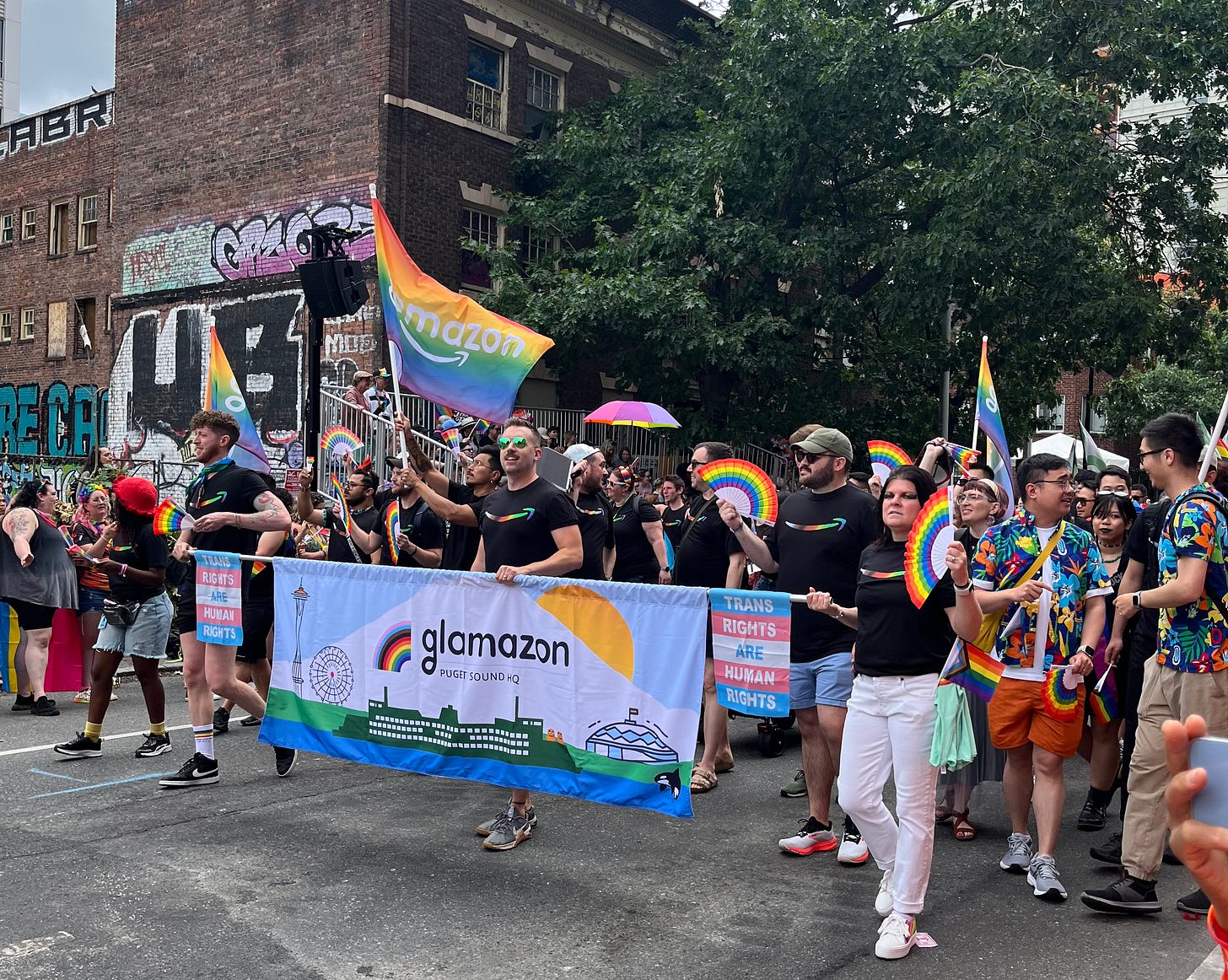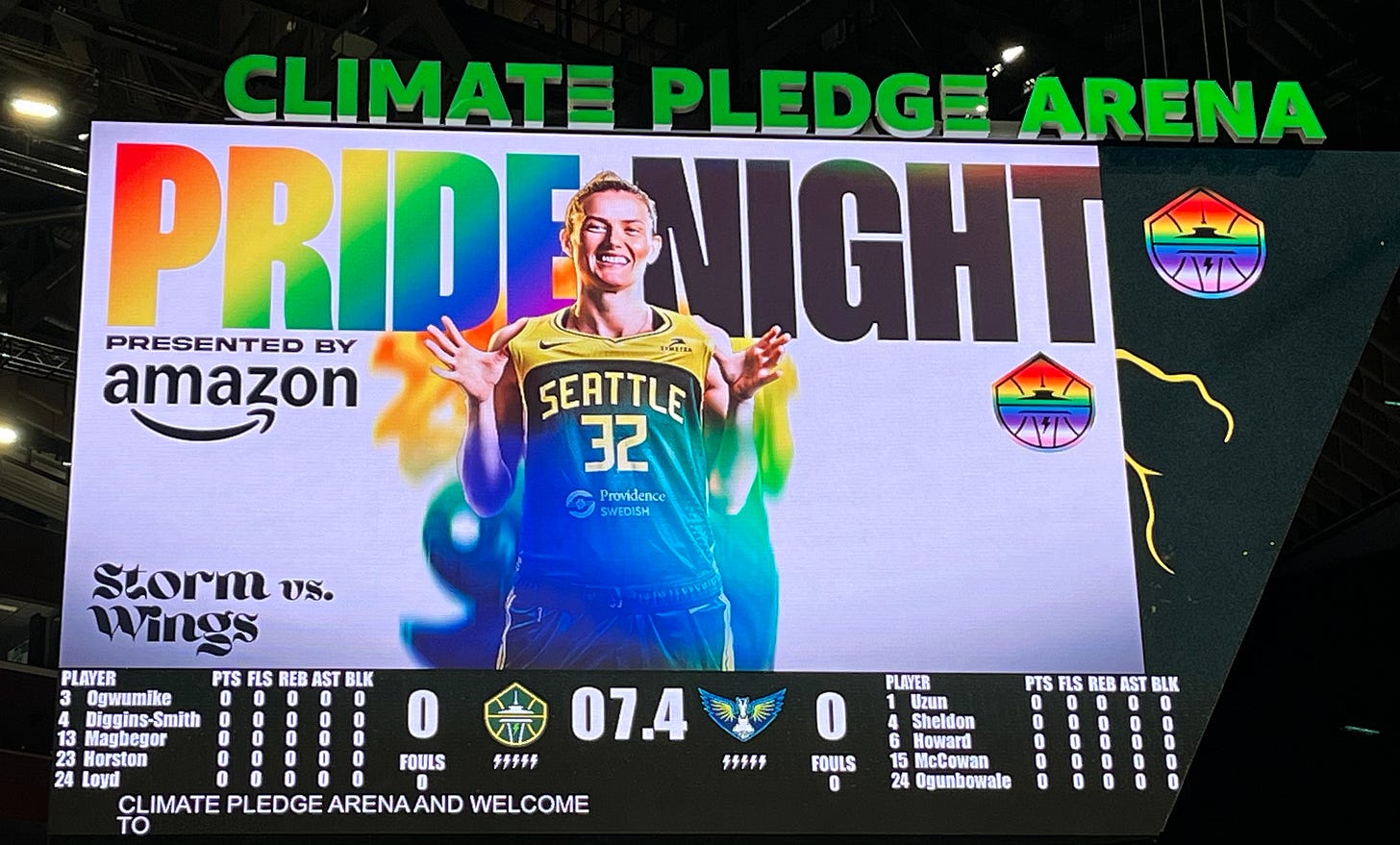Out and Proud
Because we cannot be what we cannot see
I was super excited to enjoy Pride festivities in my new hometown last weekend (my first Pride in Seattle—squee!), and Seattle did not disappoint.
My girlfriend and I saw the Seattle Storm trounce Dallas on Saturday night and watched the city’s 50th annual Pride Parade on Sunday. We donned rainbow leis and cheered on the queer elders who marched in the first parade … in 1974. 🤯 We held hands. We kissed. And we took pictures—lots and lots of pictures—in front of pretty much anything with a rainbow (see some of my Pride pictures on IG).
The joy was palpable.
It was easy to be out and proud, surrounded by our community and the many allies who showed up to support their LGBTQIA+ neighbors, family, and friends.
It wasn’t always this easy, though. When I first came out, I was quickly told by my colleagues that it wasn’t safe to be out at work—at least, not if I wanted to advance in my career. (I lived in the San Francisco Bay Area, y’all … not Iowa!) My university had several openly gay men in high-profile leadership positions, but zero out lesbian leaders, despite having several lesbians in leadership roles.
When I later interviewed for CIO roles, I was offered a position at a college where the queer staff told me it was okay to be a lesbian there … as long as you don’t show it. The college had a defacto “don’t ask, don’t tell” policy—we won’t ask about your relationship status and please don’t do anything that would cause us to know it. No pictures of your (same sex) significant other on your desk, and absolutely do NOT bring her to campus events.
Needless to say, I declined that job.

As a leader, I’ve never hidden the fact that I’m a lesbian. Like everyone else on my teams over the years, I’ve shared my previous or upcoming weekend plans. Posted pictures of my family. Brought my partner to campus/office events.
Despite being open about who I am—and despite leaning into diversity and inclusion work for the majority of my career—I never really focused on the queer part of my identity or inclusion work related to the LGBTQIA+ community.
Until I got my last CIO role.
While I was in that role, a young lesbian manager on my team told me that she was so excited to have an openly lesbian CIO. For the first time in her career she believed she could rise to a senior leadership position in IT—simply because she saw me do it.
Because we cannot be what we cannot see.
We know from diversity and inclusion literature how important it is for folks to see people who look like them in roles they aspire to. Women, African Americans, Latinx folks, Asian Americans, Indigenous people—all need to see engineers and doctors and actors and politicians that look like them. So do gay folks, and so many others.
But as leaders, we also know that the work isn’t about us.
It’s about developing our teams, growing our people, driving results for our business. Which may lead us to the conclusion that we should not talk about ourselves or share our personal lives.
Stay focused on the team, and the work—right? Wrong. To help your people thrive, you need to be out and proud about whatever it is that makes you … you.
We all have multiple identities we carry. Some may be noticeable (like gender or race) and some may be less obvious (religion, sexual identity). Some we may lean into more than others … but all are an important part of who we are as people, and as leaders.
You never know which piece of your identity might resonate with others. Maybe you have a visible disability, or an invisible one. Maybe you’ve struggled with your mental health. Maybe you’re a veteran. Or the first in your family to graduate college. Maybe you’re a single parent, or caring for an aging one. Whatever identities you carry … all of them make you wonderfully, uniquely you.
And maybe that’s exactly what someone on your team (or in your organization) needs to see—you, leading exactly as you are.
Let’s start a conversation! What do you think—as leaders, should we be “out and proud” at work? Are there any risks to leaders being open about their personal lives in the workplace?



Love you Rae. You are a role model for us all.